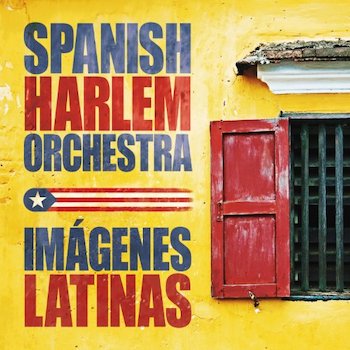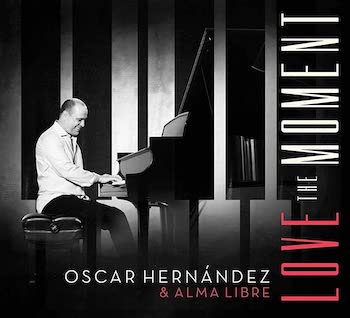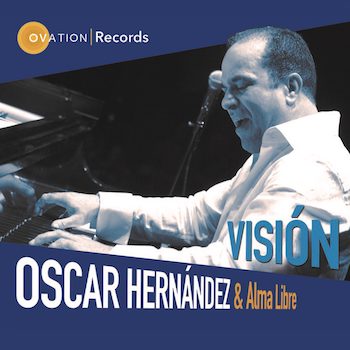Jazz Album Review: Pianist, Arranger, and Composer Oscar Hernández — Master of Latin Jazz
By Brooks Geiken
These superb recordings provide ample proof that Oscar Hernández is at the pinnacle of his career as the leader of two divergent musical aggregations.

Over the last 40 plus years who has made the most memorable music in salsa and Latin jazz? Oscar Hernández, of course. In the ’70s, Oscar was the pianist for the groundbreaking Grupo Folklorico Y Experimental Nuevayorquino and Conjunto Libre. He continued innovating with his group Carabalí in the ’80s. As musical director for Ruben Blades in Seis Del Solar (Six Guys from the Tenement), the good music kept coming. Seis Del Solar pushed the boundaries of Latin jazz into the ’90s. From the early years of the 21st century till now, Oscar plays piano and arranges and composes for The Spanish Harlem Orchestra. If that wasn’t enough, he also maintains a Latin Jazz project called Alma Libre (Free Soul).
The three-time Grammy award winning Spanish Harlem Orchestra has released an exciting new addition to its seven previous recordings. Imágenes Latinas explores the different facets of salsa through a trio of vocalists: Marco Bermudez, Carlos Cascante, and Jeremy Bosch. Each man, a talented singer in his own right, brings a distinctly different flavor to the genre. The title tune, “Imágenes Latinas,” was on Conjunto Libre’s second album Con Salsa…Con Ritmo Volume 2 Tiene Calidad” way back in 1978. The updated version is a bit more concise, but it has not lost any of its considerable political impact. The song’s lyrics are taken from a poem by Colombian author Bernardo Palombo that asks for the unification of all Latin people. Significantly, there are shout outs to the people of Venezuela and Cuba at the end of the track. Another noteworthy tune, “Vestido De Flores” (Flower Dress), was penned by vocalist and flutist Bosch. The interweaving of the flute with Mitch Frohman’s nimble baritone saxophone is masterful. Oscar Hernández’s “Como Te Amo” (How I Love You) is a bolero (ballad) that effectively generates a slow romantic mood. The only instrumental piece on the album is “Mambo 2021,” an upbeat dance number perfectly placed after the slower “Como Te Amo.”
The Spanish Harlem Orchestra specializes in hard driving dance music whose edge has been sharpened by composer Hernández’s musical direction. Among the disc’s eleven tunes he is responsible for seven arrangements and five compositions. Oscar brings plenty of verve to his arrangements for the band. The spitfire horn arrangements (for two trumpets, two trombones, and a baritone sax) are similar to those for similar outfits: trumpets blaring, trombones swinging, and that delicious bottom provided by Mitch Frohman on baritone sax. Underneath it all is the solid pulse supplied by the rhythm section of George Delgado on congas, Luisito Quintero on timbales and Jerry Gonzalez on bongos.
 Hernández’s Latin jazz group Alma Libre also deserves some long overdue attention. The band’s stellar line up includes: Hernández on piano, Justo Almario on tenor and soprano saxophones and flute, Jimmy Branly on drums, Oscar Cartaya on electric bass, and Christian Moraga on percussion. The album Love The Moment came out in 2019, but the music is so powerful it must be praised along with Imágenes Latinas. The disc opens with “Otro Nivel” (Another Level), a bright and uplifting melody. The title tune comes next, and Justo Almario serves up a superb solo on soprano sax. Oscar’s solo on “Love The Moment” is thoughtful, direct, and perfectly nuanced. The unison statement of the melody of “Latino Jazz” is splendidly launched by Oscar Cartaya on bass and Justo Almario on tenor sax. Special guest Dayren Santamaría plays violin and solos on ‘Danzón for Lisa.” The danzón is a Cuban music form that starts off with a very hesitant beat and then adopts a steady medium groove. In the liner notes, Oscar writes that ‘“Danzón For Lisa” is dedicated to my beautiful daughter.” It is quite a lovely tribute. Oscar uses the son (another Cuban musical form) on “Mi Canción Es Para Tí” with fine results. Justo contributes another fluid and warm solo, this time on tenor sax. A drum battle back and forth is the centerpiece of “Alternate Roots.” Jimmy Branly and Christian Moraga duke it out on drums and congas respectively. Oscar turns to the bolero for “Sentimiento De Amor,” a mellow, heartfelt rendition. On the last selection, “Mindful Thoughts,” the other Oskar has a prominent role. His bass is heard to excellent effect on three occasions — during the introduction, his solo, and at the end.
Hernández’s Latin jazz group Alma Libre also deserves some long overdue attention. The band’s stellar line up includes: Hernández on piano, Justo Almario on tenor and soprano saxophones and flute, Jimmy Branly on drums, Oscar Cartaya on electric bass, and Christian Moraga on percussion. The album Love The Moment came out in 2019, but the music is so powerful it must be praised along with Imágenes Latinas. The disc opens with “Otro Nivel” (Another Level), a bright and uplifting melody. The title tune comes next, and Justo Almario serves up a superb solo on soprano sax. Oscar’s solo on “Love The Moment” is thoughtful, direct, and perfectly nuanced. The unison statement of the melody of “Latino Jazz” is splendidly launched by Oscar Cartaya on bass and Justo Almario on tenor sax. Special guest Dayren Santamaría plays violin and solos on ‘Danzón for Lisa.” The danzón is a Cuban music form that starts off with a very hesitant beat and then adopts a steady medium groove. In the liner notes, Oscar writes that ‘“Danzón For Lisa” is dedicated to my beautiful daughter.” It is quite a lovely tribute. Oscar uses the son (another Cuban musical form) on “Mi Canción Es Para Tí” with fine results. Justo contributes another fluid and warm solo, this time on tenor sax. A drum battle back and forth is the centerpiece of “Alternate Roots.” Jimmy Branly and Christian Moraga duke it out on drums and congas respectively. Oscar turns to the bolero for “Sentimiento De Amor,” a mellow, heartfelt rendition. On the last selection, “Mindful Thoughts,” the other Oskar has a prominent role. His bass is heard to excellent effect on three occasions — during the introduction, his solo, and at the end.
 Visión marks the third and most recent album from Hernández and Alma Libre. The title was inspired by conversations Oscar had with his family; they taught him that in order to accomplish anything one must have a vision. That advice served him well because this recording is an artistic triumph. The title track sets the agenda for a fascinating musical journey in which Oscar contributes imaginative and forceful solos throughout, His playing adds additional fuel to “Vision'”s blazing fire. The bolero “Doña Previ” cools things down a bit, reinforced by a fine solo from Almario on flute. Then comes the extraordinary achievement of “Chick Forever.” Oscar wrote the tune as an homage to the late great pianist Chick Corea, and its bridge alludes to one of Corea’s most famous compositions, “Spain.” Oscar does not attempt to imitate Corea: he renders the push and pull of “Spain” in his own inimitable manner. “Make The Move” and “Tributo Al Son” are two more solid compositions that maintain the disc’s energy. “Spring” is interesting because it features a special guest, Joe Locke, on vibes. There is a long tradition of vibes on Latin jazz recordings — standouts include Cal Tjader, Tito Puente, Valerie Naranjo, Mike Manieri and Bobby Paunetto — and Locke takes his place with those legends via expert playing and soloing on this tune. Trumpeter Aaron Janik makes his presence felt on “Spring” with a lively solo. Another special guest, Luisito Quintero, plays timbales here and with The Spanish Harlem Orchestra.
Visión marks the third and most recent album from Hernández and Alma Libre. The title was inspired by conversations Oscar had with his family; they taught him that in order to accomplish anything one must have a vision. That advice served him well because this recording is an artistic triumph. The title track sets the agenda for a fascinating musical journey in which Oscar contributes imaginative and forceful solos throughout, His playing adds additional fuel to “Vision'”s blazing fire. The bolero “Doña Previ” cools things down a bit, reinforced by a fine solo from Almario on flute. Then comes the extraordinary achievement of “Chick Forever.” Oscar wrote the tune as an homage to the late great pianist Chick Corea, and its bridge alludes to one of Corea’s most famous compositions, “Spain.” Oscar does not attempt to imitate Corea: he renders the push and pull of “Spain” in his own inimitable manner. “Make The Move” and “Tributo Al Son” are two more solid compositions that maintain the disc’s energy. “Spring” is interesting because it features a special guest, Joe Locke, on vibes. There is a long tradition of vibes on Latin jazz recordings — standouts include Cal Tjader, Tito Puente, Valerie Naranjo, Mike Manieri and Bobby Paunetto — and Locke takes his place with those legends via expert playing and soloing on this tune. Trumpeter Aaron Janik makes his presence felt on “Spring” with a lively solo. Another special guest, Luisito Quintero, plays timbales here and with The Spanish Harlem Orchestra.
Could there be a greater testament to Hernández’s importance to Latin jazz than his leadership of two divergent musical aggregations? These superb recordings provide ample proof that he is an undisputed master.
Brooks Geiken is a retired Spanish teacher with a lifelong interest in music, specifically Afro-Cuban, Brazilian, and Black American music. His wife thinks he should write a book titled, The White Dude’s Guide to Afro-Cuban and Jazz Music. Brooks lives in the San Francisco Bay Area.
